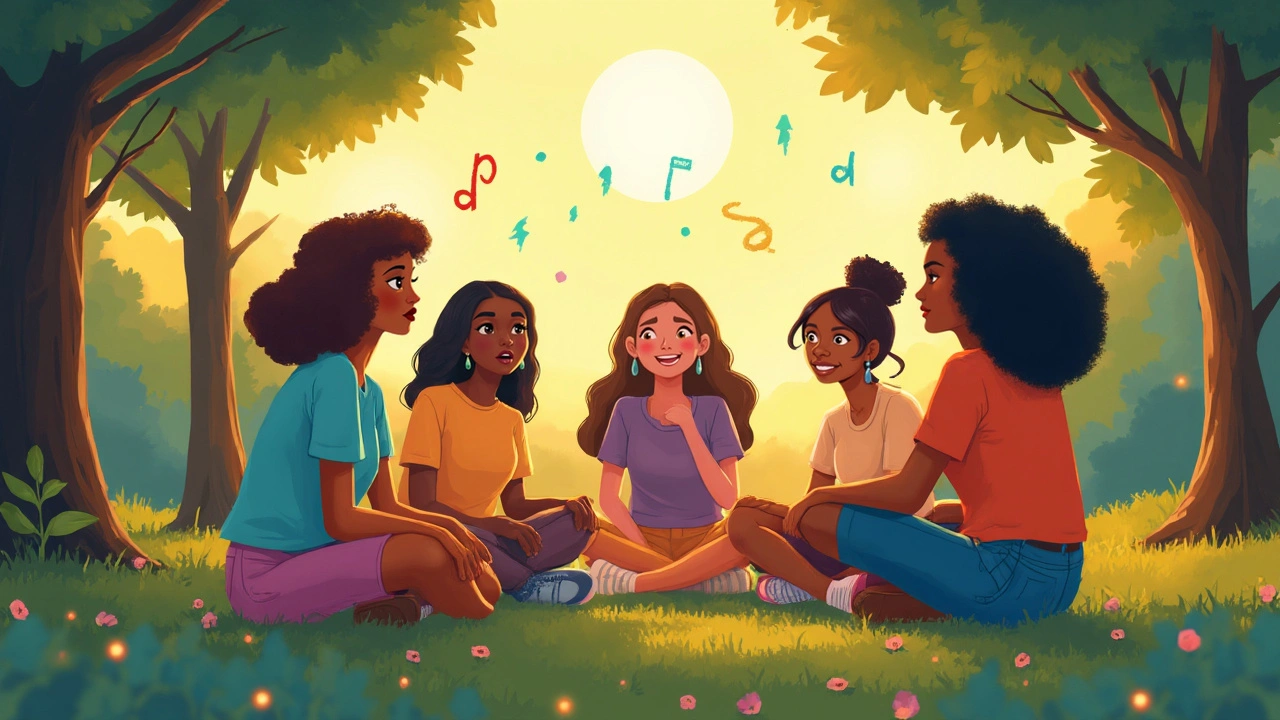Teen Girls and Group Dynamics in Modern Sexual Relationships

Tackling the intricacies of group dynamics in teen relationships? That's a biggie. You know, teens these days are often swept up in the whirlwind of peer influence, especially when it comes to the taboo subject of sexual relationships. It's like they're on a rollercoaster ride where everyone seems to have an opinion on how they should act, who they should like, and what they should do.
Picture this: You're at a party, and suddenly, it's not just about who’s there but who they’re with. Sounds familiar? It's vital to grasp how these group settings can deeply sway decisions. Several studies highlight that teens are more likely to engage in risky behaviors, including sexual activities, when they believe their peers are doing the same.
- Understanding Group Influence
- Navigating Peer Pressure
- Communication with Peers
- Impact of Media and Society
- Empowerment Through Education
- Tips for Parents and Teens
Understanding Group Influence
The power of group dynamics is no joke, especially among teen girls navigating sexual relationships. Peer groups can often feel like a compass for what's 'normal' or 'cool,' shaping the decisions we make, sometimes without us even noticing.
Here's an interesting tidbit: psychologists have long noted that teens are hardwired to seek acceptance and validation from their peer groups, which often outweighs parental influence when it comes to social behaviors. So, when a friend group sets a norm or behavior trend, others tend to follow suit.
This phenomenon is partly due to a couple of concepts called 'groupthink' and 'herd mentality.' These terms describe how individuals might conform to the majority, making choices based more on social conformity than personal beliefs. In sexual situations, this means that a teen might engage in activities because they perceive it to be the norm among their peers, rather than something they genuinely want to do.
Another fact to chew on: studies show that when teens are in a group, they might be more prone to take risks, a little peer pressure making them think, 'Well, if everyone else is doing it, why shouldn't I?' It's like the classic 'everyone's jumping off the bridge, should I?' scenario, but in a more modern, socially impactful way.
The trick, really, is to understand these influences and recognize them in daily life. Encourage teens to ask themselves who they are beyond their friend's opinions and the group dynamics. It’s also about building self-confidence to stand by personal values, even if they go against the group's current.
Navigating Peer Pressure
Handling the pressure from friends, especially as a teen girl, can feel daunting. It's like walking a tightrope between fitting in and staying true to yourself. Friends can be persuasive, sometimes without even realizing it, and it's easy to get caught up in the moment. Here are some straight-talk tips to help navigate through this maze.
First off, recognize that it’s completely normal to feel pressure. Almost every teen experiences it. Studies show that a significant chunk of teens agree to things they’re unsure about because they want to be accepted by their peers. The key is to know that everyone has felt that tug at some point, and it’s okay to take a step back.
What's crucial is having a personal boundary set. Think of these as your personal 'lines in the sand'—what you're comfortable with and what you're not. When you're in a group situation and the peer pressure hits, remember your boundaries. They will be your anchor.
Practicing how to say 'no' is a game-changer. It sounds simple, but in the moment, it can be hard. Here’s how you can do it effectively:
- Be confident: You don’t have to be loud, just firm. A clear 'No, I'm not comfortable with that' works wonders.
- Use 'I' statements: Express how you feel personally, like 'I feel it's not right for me.' This keeps the focus on your feelings rather than sounding judgmental.
- Offer alternatives: If you're at a party and feel pressured to drink or participate in something risky, suggest a different activity, like playing a game or just chatting.
Peer pressure can also stem from comparing yourself to others, especially with social media painting a picture-perfect version of everyone's life. Remember, most of what you see is carefully selected highlights, not an everyday reality.
It might surprise you, but sometimes just having one friend who 'gets it' and supports your choices can make all the difference. If you find it hard to talk to your current friends, seek a support group or community where you're free to be you. Every bit of reinforcement helps in staying steadfast in your decisions.
Peer pressure is part of the teenage experience, but it doesn't have to dictate your choices. Stay honest with yourself, rally up your support network, and don't hesitate to walk away from situations that don't align with your values. After all, nothing's cooler than being real to yourself.
Communication with Peers
Let's dive into the nuts and bolts of chatting with friends about sexual relationships, shall we? First off, having open lines of communication among teens is crucial. It’s less about spilling all your secrets and more about building a network of trust. But why does this matter so much? Well, when teen girls feel comfortable talking openly with their pals, they’re in a better position to make informed decisions, especially when it comes to group dynamics and relationships.
Being a part of the social circle means you might face questions or discussions about what others are doing, and that can trigger some serious peer pressure. Remember, it’s really helpful to have honest conversations and support one another. Encouraging a friend to share what they're comfortable with can be a game-changer. But how do you do this without turning things awkward?
- Listen attentively: Sometimes, just being a good listener helps friends open up about what they're going through.
- Be non-judgmental: Everyone's journey is different. You can't walk it for them, but you can appreciate where they’re coming from.
- Encourage honesty: Creating a safe space where honesty thrives means being patient and respectful, even if you don’t see eye to eye.
Also, it's worth noting the increasing role of digital communication. Apps and social media platforms are where a lot of these conversations start nowadays. They might be a blessing in disguise, offering a low-pressure environment to discuss things anonymously or semi-anonymously. But with this, there's also the risk of misinformation spreading like wildfire. It's key to remind each other to fact-check and not take everything at face value.
If we look at some stats, a survey showed about 55% of teens say they often feel pressured to share personal details online, fearing they might be left out otherwise. Navigating this digital landscape smartly means knowing when to unplug or, at least, not letting online chatter cloud real-life judgment.
Building healthy communication skills with peers helps teens make decisions based on their own values and comfort levels, not just because 'everyone else is doing it.' Open conversations can empower teen girls to support each other, turning what could have been a roadblock into a stepping stone.

Impact of Media and Society
Alright, let's dive into how the world around us—the media and society—plays a big role in shaping teen girls' views on sexual relationships. It’s no shocker that media portrayal, from TV shows to Instagram influencers, can affect how teens think about sex. Often, these portrayals are glamorized or unrealistic, setting a bar for what's considered 'normal' or 'cool.' And let's be honest, it can be hard to tell what's real when everyone's curating perfect lives online.
For example, studies have shown that exposure to sexual content in media is linked to earlier sexual initiation and riskier sexual behaviors among teenagers. When teens see certain behaviors frequently profiled in media, it can normalize these actions, making risking it seem okay or even expected.
But media isn’t doing the influencing all by itself. Society’s expectations can be just as loud. Ever heard of the term 'hookup culture'? It refers to societal beliefs and norms that encourage casual sexual encounters. While it might sound liberating, it often places pressure on teen girls to act in ways they might not be ready for or comfortable with.
Here's where finding balance becomes crucial. It’s important for teens to critically analyze what they consume. They should question if what they’re seeing aligns with their values and beliefs and have open talks with trustworthy friends or adults to sort fact from fiction.
A survey could be eye-opening here:
| Media Type | Influence on Teen's Perception |
|---|---|
| TV Shows | 35% feel pressured to match what they see. |
| Social Media | 50% say it skews their understanding of relationships. |
| Movies | 20% admit it impacts their views on intimacy. |
By being media-savvy and dissecting these influences critically, teens can carve their own path, one that’s true to them, rather than just following the crowd.
Empowerment Through Education
Let's be real: education is the game-changer when it comes to navigating teen relationships and making smart decisions. It's not just about the birds and the bees anymore. We're talking about understanding emotions, respecting each other’s boundaries, and building healthy relationships.
Dishing out accurate and accessible info to teenagers isn't just helpful; it's necessary. Dr. Christine Carter, a sociologist at UC Berkeley, once said,
"Teens who have comprehensive education are often more equipped to manage the complexities of sexual relationships and make decisions aligned with their values."Makes sense, right?
- Comprehensive sexual education can reduce misconceptions and equip teens with the tools they need.
- Parents and educators play a crucial role by fostering open discussions—not just delivering facts.
- Educational programs should debunk myths and encourage critical thinking about peer influence and societal pressures.
Evidently, there's a tangible impact here. For instance, a report from the CDC showed that schools offering coherent relationship education programs often see a decrease in chaotic teen dynamics and unsafe practices. That’s some pretty compelling evidence.
Encouraging communication and offering relatable scenarios in these programs make the info stick and seem more practical for teens. You know, instead of just another boring lecture or pamphlet, kids get to interact and engage. So, remember, it's not only about knowing the right stuff; it's also about planting seeds for informed decisions in those group settings.
Tips for Parents and Teens
Dealing with the ins and outs of group dynamics in teen relationships can be tricky for both parents and teens. It's about striking a balance between guidance and independence.
For parents, it's all about being there without hovering. Be approachable so your teen feels comfortable coming to you with whatever’s on their mind. Encouraging open conversations about teen girls and their experiences can make a big difference. Remember, communication is your best friend in this situation.
Here's a quick list of what you can do:
- Listen actively: Don't just hear what they're saying, but really listen. Teens can spot fake interest a mile away.
- Avoid judgment: Keep your cool, even if what's being said surprises you. Being non-judgmental opens the door for honesty.
- Provide facts: Give them accurate information rather than relying on myths or misconceptions. This builds trust and helps them make smarter choices.
"The best way to prepare our youth is to give them the skills and knowledge to make informed decisions." – Dr. Emily Hunter, Youth Behavioral Specialist
For teens, it's about finding your voice in the sea of influences. It's okay to ask questions or even say no when you're not comfortable. Peer pressure can be powerful, but knowing your own values can help guide your decisions.
- Know your boundaries: They're your own to set and not for anyone else to decide on.
- Seek support: Friends, family, or counselors can offer advice. Don't be afraid to reach out.
- Stay informed: Knowledge is power. The more informed you are, the easier it is to navigate these complex situations.
A study from the Wellington Youth Services revealed that more than 60% of teens feel pressured by their friends when it comes to relationships. Having a strong support network can significantly ease these pressures for teen girls.
Remember, at the end of the day, it's all about making informed choices. Whether you're a parent or a teen, having the right conversation can lead to better understanding and stronger relationships.
